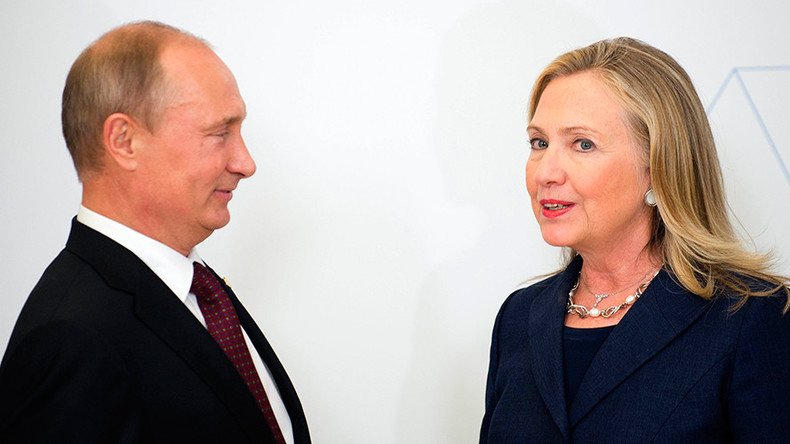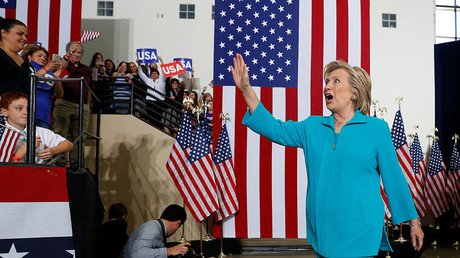From bad to worse: Clinton laying foundation for increasingly hostile relations with Russia

Let’s be honest: Hillary Clinton and Vladimir Putin aren’t exactly the best of friends. But Clinton appears to be intent on making a bad situation worse — and all to score a few political points.
The relationship with Russia is one Clinton should be taking very seriously. If she wins the presidency in November, relations between Washington and Moscow will continue to be a major foreign policy priority. They have already hit a 25-year low. It should go without saying then, that when it comes to Russia, Clinton should not mince her words.
As a woman who spent four years as her country’s chief diplomat, Clinton should know better than to publicly insult the leader of a country with whom she will have to work closely. Yet it appears that this has entirely escaped her awareness. Instead, she has opted to ramp up anti-Moscow paranoia to the point that it wouldn’t be overly surprising if her campaign announced they were releasing an updated version of Red Channels — a 1950s pamphlet that named and shamed public figures suspected of being Kremlin sympathizers.
Grand godfather of white supremacist nationalism?
Clinton’s most memorable insult directed at Putin was back in 2014 — before she was running for president — when she compared him to Adolf Hitler. In a country that celebrates their victory over Nazism every May 9, you can imagine that didn’t exactly go down well. Since then, there’s been a steady stream of comments from Clinton about ‘the Russians’ and how to deal with them. At one point, she mocked Putin’s movements and voice during an interview with Christiane Amanpour. Hardly ‘chief diplomat’ kind of behavior.
But things took a bizarre turn this past week, when in a speech about the xenophobia of Donald Trump, Clinton called Putin the “grand godfather” of a global, nationalist white supremacist movement. Confused? Here’s the reasoning: Trump said some nice things about Putin. Trump wants to improve relations with Moscow. There are extreme right-wing nationalists in Russia. Trump therefore is part of a global cohort of white supremacists led by Putin. Simple.
The mental gymnastics Clinton expects her supporters to engage in to make this claim stack up to anything meaningful are quite something. Ironically, in stoking fears of the Russians out to get the world, Clinton is engaging in the kind of fear-mongering that she claims to abhor in Trump. Of course, it may not be as bad as calling Mexicans immigrants rapists, as Trump did, but the root of it — appealing to fears and prejudices to manipulate and distract voters — is the same.
Hillary Clinton just said Vladimir Putin leads a world wide white supremacist movement. Wow.
— Josh Rogin (@joshrogin) August 25, 2016
Putin, to be fair, has on occasion made less than flattering comments about Clinton. In response to the Hitler incident for instance, he said Clinton is not known for being “graceful in her statements” and it’s “better not to argue with women” — an undeniably sexist comment to Western ears. He added that when people “push boundaries too far”, it’s a sign of weakness, not strength. The key difference to note here, however, is that these comments, however you feel about them, have usually been made in response or retaliation, not out of the blue.
Neither has Putin stooped to the level of American political leaders in insulting the American people. In fact, he has at times been complimentary, admiring the American creativity, openness and open-mindedness, which has led to “such amazing results” in the development of their country.
On the other hand, you get Barack Obama saying things like “Russia doesn’t make anything” and no one is “rushing to Moscow” for opportunity. Then you have John McCain, a former presidential candidate, who says things like Russia is a “gas station masquerading as a country”. In the American handbook on diplomacy, under the term ‘respect’ it must say: You will respect and revere us, but don’t expect reciprocation.
All roads lead to Moscow
But back to Clinton. In her mind, it seems everything now comes back to the Russians. DNC email leaks that expose party corruption? Russians. Her opponent? Russian agent. WikiLeaks? Russian front. Global right wing white supremacist movement? Led by Russia. What’s next? I’m sorry for Clinton Foundation/State Department corruption, the Russians made me do it?
Clinton’s campaign is now built on two things, neither of them having anything to do with her own credentials: 1. Convincing voters that her opponent is worse than she is, and 2. Blaming any and all embarrassing revelations on Russia. That has been the core of her campaign strategy in recent weeks. Why? Because her campaign has been so dogged by scandal, that it simply makes sense to spend less time addressing those real issues and more time pointing at distractions.
When November 8 rolls round and Clinton wins — which is likely if polls are to be believed — how will she pick up the phone to Moscow and expect that her months-long campaign built on Russophobia won’t have further damaged a relationship that is so desperately in need of repair? Instead of taking out a band-aid, Clinton is reaching for a hatchet. It’s stupid, short-sighted and dangerous. Imagine during the diciest moments of the Cold War, the occupant of the White House had entirely dismissed Soviet leaders and acted like diplomacy with those deplorable Russians wasn’t really worth their time. Imagine if they had chosen to disengage and publicly mock them. The Cold War may have ended on a decidedly different note.
It’s unlikely that the American people want any kind of serious confrontation with nuclear-armed Russia — but the cheap political points that Clinton can score today by playing the Russia card could come at a much higher price down the road.
The statements, views and opinions expressed in this column are solely those of the author and do not necessarily represent those of RT.














